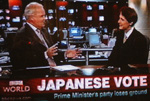Has Koizumi Lost his Shine?
David Jessel (Presenter, BBC News)
J. Sean Curtin (Fellow, GLOCOM and Asia Times)
 The latest post-election opinion polls all indicate that Prime Minister Junichiro Koizumi is not as popular as he once was. A new Yomiuri Shimbun poll clearly illustrates this, showing Koizumi's approval rating plunging to 43.3 percent while his disapproval rating has hit 46.3 percent. The latest NHK survey for July shows a similar trend with 43 percent of the public saying they support the Koizumi Cabinet, while 45 percent did not. The latest post-election opinion polls all indicate that Prime Minister Junichiro Koizumi is not as popular as he once was. A new Yomiuri Shimbun poll clearly illustrates this, showing Koizumi's approval rating plunging to 43.3 percent while his disapproval rating has hit 46.3 percent. The latest NHK survey for July shows a similar trend with 43 percent of the public saying they support the Koizumi Cabinet, while 45 percent did not.
Dramatically confirming this downward poll trend, Koizumi's Liberal Democratic Party was knocked into second place in the recent Upper House election. What does this mean for the Premier and the long governing Liberal Democratic Party?
 David Jessel: We have a bit of a paradox. Here we have got Koizumi, one of the most popular and charismatic LDP leaders ever, yet he appears to be presiding over the end of the hegemony that his party has enjoyed since 1955. David Jessel: We have a bit of a paradox. Here we have got Koizumi, one of the most popular and charismatic LDP leaders ever, yet he appears to be presiding over the end of the hegemony that his party has enjoyed since 1955.
Sean Curtin: That's a good observation, but we mustn't oversimplify. Yes, the Upper House election results were a setback for Koizumi and the LDP. However, Koizumi has been a phenomenon unto himself. For most of his period in office, he has been so popular that he has actually managed to slow the long-term decline in support for his party. This is one of the reasons he is still in office. It is true that after the Upper House results he is more vulnerable, but we have to also remember that the LDP are still firmly in power.
David Jessel: So what has done the damage? Have the voters just gone off Koizumi or is it something to do with Iraq?
Sean Curtin: I think it is some of these things. We see that the political shine comes off all leaders eventually. For Koizumi there have been two specific issues. Firstly, there are Koizumi's unpopular pension reforms which basically mean people have to pay more but will end up getting less. Secondly, there is the issue of Japanese troops in Iraq. In recent months this has also become a significant problem for Koizumi. This issue is tied up with the sensitivity surrounding Japan's war-renouncing constitution.
David Jessel: On the pension reform issue, there has been a certain amount of sleaze in political circles with disclosures that quite a lot of politicians did not paid their pension contributions.
Sean Curtin: Yes, I think you have hit the nail on the head here. It has been a fascinating scandal, if one can say that of a scandal. The government was pushing forward its pension reform, telling people to pay their pension contributions, then it was discovered that a lot of leading lawmakers had not paid their premiums, including Koizumi and the leader of the opposition DPJ. The former opposition leader, Naoto Kan, had to resign, but the DPJ were lucky as he was replaced by a more dynamic leader, Katsuya Okuda. He did very well for the DPJ in the election. Koizumi's closest political ally, Yasuo Fukuda, also had to resign. This all caused quite a scandal and generated a lot of public resentment.
David Jessel: Mr. Koizumi has more or less had the television to himself. He is very good on television. This new Democratic Party leader, Katsuya Okuda, he has come across as pretty telegenic himself.
Sean Curtin: Yes, I agree with you, Okuda has come over very well. Koizumi is a master at what he does and as you say he uses the television and media to project a positive image. Mr. Okuda has also managed to accomplish this very well. He is relatively youthful. He is seen on TV pushing weights and presents an energetic message. This has enabled the party to attract younger voters who have gone off Koizumi, who now looks a little stale.
The above discussion was originally broadcast as part of BBC World's post-election analysis on 12 July 2004.
Related Articles
Japan: Two parties, but only one celebration
J. Sean Curtin, Asia Times, 13 July 2004
Koizumi's fate may be sealed with a kiss
J. Sean Curtin, Asia Times, 10 July 2004
Koizumi has a real fight on his hands
J. Sean Curtin, Asia Times, 3 July 2004
| 




